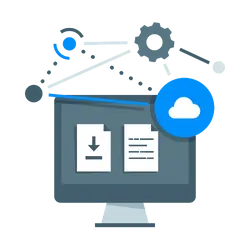Introduction
Starting an online business seems like a dream come true for many people. No office space, no daily commute, and the freedom to work from anywhere in the world. But how exactly do you get started? Whether you’re based in Mumbai, New York, or anywhere in between, launching an online business can be a lucrative way to earn money and build a career. In this guide, we’ll walk through practical tips, some easy-to-follow steps, and essential advice on how to get your business up and running.
1. Identify Your Niche
Choosing a niche is one of the most important decisions you’ll make when starting an online business. It’s tempting to think you can serve everyone, but focusing on a specific audience is often a smarter approach. For example, if you’re based in India, you could tap into the growing wellness trend and offer products or services related to yoga, Ayurveda, or organic skincare. Look for what people are searching for and find a gap you can fill.
One way to find a niche is to explore your own interests and passions. What do you enjoy talking about? What problems do you see around you that need solving? If you’re passionate about something, chances are others will be too. Take a look at your own daily life—are there products or services that could make it better or more efficient? That’s often the perfect place to start.
Market Research: Where to Start
Before you go full throttle, you should do some research to validate your idea. Platforms like Google Trends, Reddit, and Quora are great tools to see what people are talking about. Plus, you can check out your competition on social media or e-commerce sites. Are there a lot of players in your niche, or does it feel like there’s room for growth? Understand both demand and competition before you invest your time and money.
2. Choose Your Business Model
Now that you’ve got your niche, it’s time to think about your business model. There are a few options here, depending on what you’re offering and how you plan to operate:
- E-commerce Store: If you want to sell physical products, consider starting an online store. You could create your own products or use dropshipping, where you partner with suppliers to handle inventory and shipping.
- Freelancing: If you have a specific skill, like graphic design, web development, or content writing, freelancing could be a great route. Websites like Upwork and Fiverr can connect you to clients worldwide.
- Digital Products: Selling digital products like e-books, courses, or software is an increasingly popular model. Once you create the product, it can be sold over and over again with little additional cost.
- Affiliate Marketing: If you don’t want to create your own product, you can earn commissions by promoting other people’s products. This can be done through blogs, YouTube channels, or social media.
Once you choose a model, plan out the logistics. How will you handle payments? What platform will you use to sell your product? Websites like Shopify, Etsy, and WooCommerce are great options for e-commerce businesses, while freelancers can set up profiles on job platforms.
Legal and Tax Considerations
Before you launch your business, make sure you understand the legal and tax implications. Depending on your country, you might need to register your business or get certain licenses. For example, in India, it’s important to register your business as a sole proprietorship or private limited company for legal protection and tax purposes.
Also, keep in mind that tax rules for online businesses vary widely by country. It’s worth consulting with an accountant or lawyer who specializes in international business to make sure you’re on the right track. For Indian entrepreneurs, the Goods and Services Tax (GST) is one area you’ll want to understand if you’re selling products or services online.
3. Build a Strong Online Presence
In the digital world, visibility is everything. Building a website or e-commerce store is just the first step. You need to ensure that people can find you online, and there are a few key strategies for doing this:
- Social Media Marketing: Platforms like Instagram, Facebook, and LinkedIn are essential for promoting your business. Regularly post updates, engage with followers, and use paid ads to reach a broader audience.
- SEO (Search Engine Optimization): Invest time in optimizing your website for search engines. This can be as simple as making sure your website loads quickly, has clear descriptions of your products or services, and contains relevant keywords.
- Content Marketing: Blogging, creating YouTube videos, or even starting a podcast can help attract organic traffic. Content marketing builds your authority in your niche and offers value to your audience.
- Email Marketing: Don’t underestimate the power of email. Collect customer emails and send regular newsletters or promotions. Tools like MailChimp and ConvertKit can help you set up automated email campaigns.
Develop a Customer-Centric Approach
Building a loyal customer base is not just about selling a product. It’s about creating an experience that makes your customers feel valued. Offer excellent customer service, engage with them on social media, and regularly seek feedback to improve your offerings.
4. Managing Finances and Scaling Up
When you’re starting out, it’s easy to overlook the importance of proper financial management. Keep track of all your expenses, set a budget, and avoid unnecessary spending. Tools like QuickBooks, Xero, or even Google Sheets can help you monitor cash flow and track profits.
As your business grows, consider reinvesting your profits into scaling up. You might hire employees, invest in better marketing, or expand your product line. This is the point where many entrepreneurs get stuck—trying to grow without a clear plan. Set specific goals, break them down into smaller, actionable steps, and monitor your progress regularly.
Conclusion: Take the Leap
Starting an online business is not easy, but it’s definitely worth the effort. From choosing a niche to scaling up, the process requires dedication, creativity, and smart decision-making. If you’re based in India or anywhere else in the world, the opportunities are limitless, especially with the rise of digital tools and platforms.
The key takeaway? Start small, stay focused, and continuously adapt. Every business has its ups and downs, but with the right mindset and strategy, you can make your online business a success. So, what are you waiting for? Get started today!



